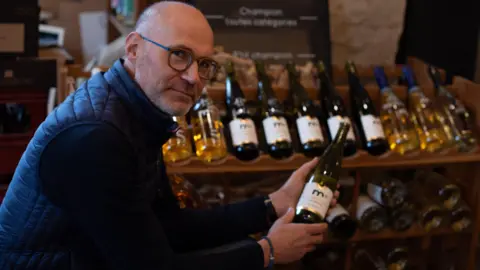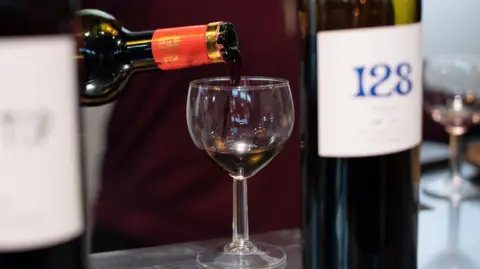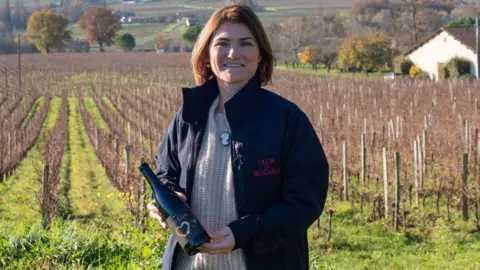 BBC
BBCIn the vineyards of Bordeaux, the unspeakable has become the drinkable. Wine without alcohol has arrived.
The heresy of yesterday is now – thanks to science and economic crisis – the opportunity of today.
Wine estates which would have torched their grapes rather than submit to such ignominy, are now openly contemplating the booze-free bottle.
And developers are moving ahead fast, creating wines that are deliberately designed to get the best from the de-alcoholisation process.
“When we started a few years ago, what we were making was frankly rubbish,” says Bordeaux oenologist Frédéric Brochet, who has helped create the Moderato range of no-alcohol wines.
“But we have made great progress. And today we are getting nearer and nearer to our goal. I think it is going to be a revolution in the wine world.”
Bordeaux has just seen the launch of its first ever cave – wine shop – dedicated solely to no-alcohol wines, reflecting a shift in perceptions which has taken many in the industry by surprise.
“We only opened four weeks ago, and already we are getting wine-growers from the area coming in and asking about the non-alcohol market,” says Alexandre Kettaneh, who owns Les Belles Grappes with his wife Anne.
“They don’t know anything about how to do it, but they can see it is coming and want to be part of it.”
Several things have happened to make the moment opportune.
First of all, the French wine world is in deep difficulty. Domestic consumption continues to fall and the Chinese market is not what it was. US President-elect Donald Trump is threatening new levies. Prized ancient vineyards across France are being grubbed up.
Second, consumption habits are shifting, especially among the young. Supermarkets now give more space to beer than they do to wine. Most 20-somethings have never had the habit of wine – and they are also far more health-conscious than their elders.
The non-alcohol lifestyle is spreading. Currently 10% of the French beer market is alcohol-free. In Spain it is 25%.
And third – the technology has improved by leaps and bounds.

In the past – and still today for cheaper brands – the method has simply been to boil away the alcohol and then add compensatory flavours. The result – especially for reds – is at best mediocre. Such drinks cannot even call themselves wine, but “beverages based on de-alcoholised wine”.
Now though, there are new methods of low-temperature vacuum distillation, and of “capturing” aromas for putting back into the de-alcoholised wine. The result is wines that can legally call themselves wines, and are beginning to hold their own among discerning consumers.
“With reds, you need to be prepared for an experience which will not be the same as a traditional wine with alcohol. We cannot pretend we can replicate, yet, the full mouth-feel,” says Fabien Marchand-Cassagne of Moderato.
“But what you will get is a genuine wine moment. Bouquet, tannins, fruits, balance – it is all there to be enjoyed.”
At the Clos De Bouard estate near Saint-Emilion, fully a third of sales are now of the chateau’s two – soon to be three – non-alcoholic brands. Owner Coralie de Bouard first glimpsed the possibilities when she was asked in 2019 to develop a non-alcoholic wine for the Qatari owners of PSG football club.

“My family wouldn’t talk to me for a year, such was my ‘treason’. And even today I get hate mail from wine-growers saying I am ruining the market,” she says.
“But now my father congratulates me and says I am the locomotive in the wine train. And if we are surviving today in these difficult times, it is because we have shifted towards the no-alcohol market.”
“For the purists it’s been very difficult to accept,” says Bernard Rabouy, a wine-grower for the Bordeaux Families cooperative.
“But we have to evolve. The fact is that the customers aren’t where they used to be. So we have to go and get them or they will go somewhere else.”
Promoters of alcohol-free wine make much of the notion that it allows non-drinkers – who used to feel excluded – to join in the wine-banter. And it is true that the rituals of opening, sniffing, describing and comparing are now open to all.
“What we want to do is try to bring back the France of our youth – when everyone sat around the dinner table and drank wine, and it was a real moment of sharing,” says Anne Kattaneh.
“And these days the only way we are going to be able to do that is if non-alcoholic wines are part of the culture.”
“The idea that the wine world was always as it is now, is rubbish,” says oenologist Brochet.
“Things evolve. Once upon a time the barrel was an innovation. The cork was an innovation; grape varietals were an innovation. And now this is a new one – which could help save the industry and the wonderful landscape and culture that goes with it.
“As [poet] Paul Valery said – what is tradition, but an innovation that succeeded?”


